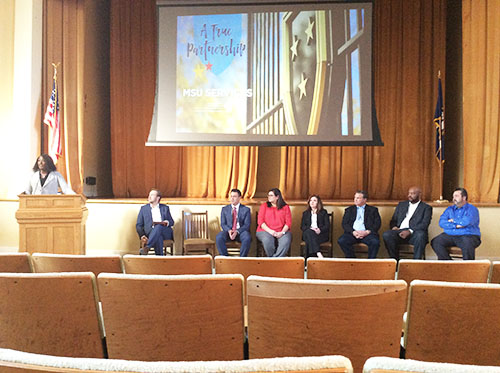Daniella Tebib
News Editor
dtebib@murraystate.edu
The Board of Regents voted on Dec. 13, 2019, to outsource the custodial services and grounds departments to the company SSC.
The University notified the company of the contract on Dec. 18, 2019, which will take effect on April 13. The initial contract will be five and one-fourth years, with five optional one-year renewals.
The motion passed with 10 votes in favor and one opposed. The motion included five recommendations presented by Vice President of Finance Jackie Dudley.
To select a suitable company, an evaluation committee was created to review proposals and narrow down the options. Members of the committee include several on-campus faces, from students to facility staff members.
“We’ve tried to compile a really cross-section team to look at these because everybody looks at these services in a different way,” Dudley said in the meeting. “We all have a different view.”
Prior to voting, Dudley said outsourcing the departments is beneficial and necessary for several reasons.
“We need this for the recruitment of students, retention of students, maintenance of our facilities and grounds and the safety on campus is tied to a lot of custodial and ground services that we have,” Dudley said in the meeting.
Dudley also said she believes, based on the review of proposals, that the University will save between $400,000 and $1 million by outsourcing the custodial services and grounds departments.
“This change will save the university several million dollars over the course of the contract due to current pension system rates of 49.47%, proposed to increase to 93.01% on July 1, 2020,” said Shawn Touney, director of communication.
Several surrounding universities have outsourced their custodial work for years, including Western Kentucky University, Eastern Kentucky University, Morehead State University, University of Kentucky and University of Louisville.
During the meeting, multiple regents spoke in favor of outsourcing.
“Murray State University does not want to continue to be managing trailers, mowers, weedeaters, construction equipment, gas, diesel and trying to keep the latest tech and maintenance equip,” Regent Don Tharpe said in the meeting. “Whereas if you subcontract that out, they’ll have the newest best sub-zero turn mower out there cutting that grass, and you don’t have to worry about it. To me that’s one area where we can save a lot of money.”
Trey Book, student regent and Student Government Association president, spoke on behalf of the student body to thank the committee for ensuring student opportunities would continue to be available.
“I want to say thank you to the committee for making sure these companies are still going to employ students,” Book said in the meeting. “These positions are very important to students as well. And thank you for making sure they not only employ them, but that there’s room for advancement and learning in these trades.”
Melony Shemberger, faculty regent and associate professor of journalism and mass communication, was the only member to vote in opposition of the motion.
Shemberger vouched for the benefits of current employees and shared some of their concerns.
“One of the main questions that employees from the custodial and grounds departments asked each vendor was related to postsecondary tuition waivers, a customary benefit that colleges and universities across the country offer to their employees and families,” Shemberger said. “Some of these employees use, or had planned to use, the waivers to finance their children’s college education or perhaps their own. That benefit will be lost come April. I know what it’s like to lose a significant benefit such as tuition waivers. It stings.”
Shemberger also said she is concerned outsourcing will become the first option in the future and no longer be a last-resort alternative.
“I fear that outsourcing will become the be-all, cure-all approach in eliminating other services to tackle the monstrosity that the state pension and other financial straits have placed on Murray State University, when it should be a last-ditch effort after other possible solutions have been identified and assessed,” Shemberger said. “Furthermore, higher education must be regarded highly and funded well in Kentucky to help avoid moves such as outsourcing.”


























































































